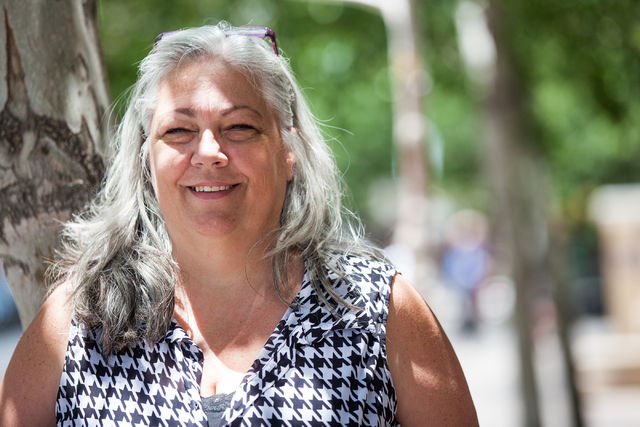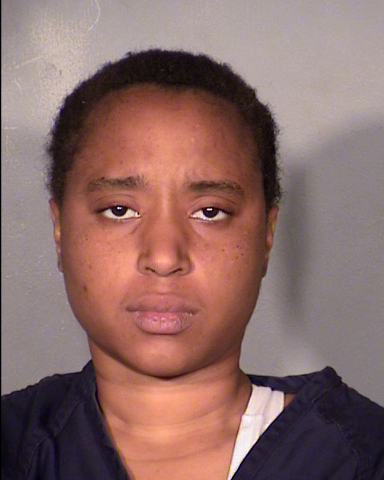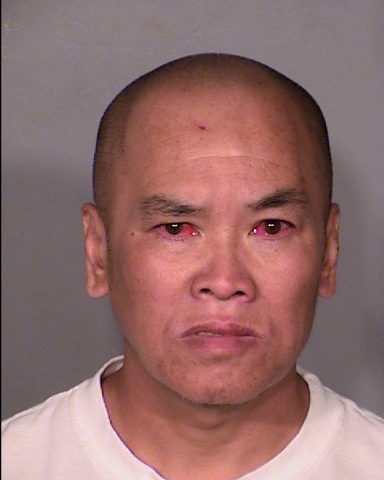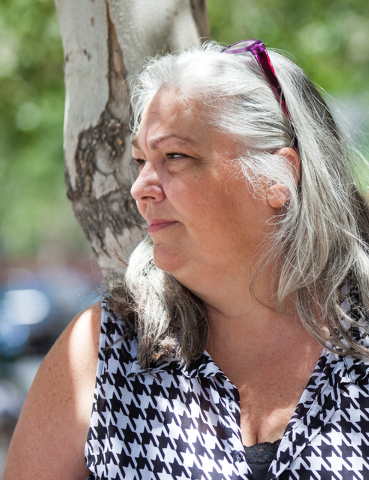Repeat offenders called too much for Nevada mental health program to help them
When Destiny Brown ended up at the Clark County Detention Center on May 1, no one should have been surprised.
The 23-year-old woman has a history of mental illness, which she refuses to treat if left to her own devices, as well as about a dozen criminal cases since 2006, court records show.
But Brown’s lawyer says her jailing is costing the county tens of thousands of dollars and could have been prevented.
Deputy Public Defender Christy Craig motioned in February to have Brown admitted into a new state-run program called Assisted Outpatient Treatment aimed at supervising people like Brown to participate in court-ordered treatment to keep them from reoffending and out of jail.
But Brown was denied access to the program because she was too difficult to handle, Craig said. Instead, she was released from custody with no supervision.
By May, Las Vegas police were called because Brown was acting out of control. The officers called emergency medical workers to take her to the University Medical Center emergency room to have her committed. Brown struggled with the medical workers. Then at the hospital she struggled with a nurse.
Now she’s back in jail and facing three battery charges.
The irony, Craig said, is that Brown is considered too noncompliant for AOT, which was enacted into law during the 2013 legislative session with the specific aim of getting treatment to those patients considered too noncompliant.
COURT’S POWERS CHALLENGED
Brown’s battery cases are now stuck in District Court where Judge Linda Bell has shown frustration with the state attorney general’s office for arguing the judge doesn’t have jurisdiction to order Brown into the Assisted Outpatient Treatment program.
Bell runs the specialty mental health court, aimed at getting the mentally ill on treatment plans and monitoring their progress to keep them out of jail, which is where Brown inevitably ends up each time she gets a new criminal case.
During a May 23 hearing in the case, Senior Deputy Attorney General Susanne Sliwa, representing Southern Nevada Adult Mental Health Services, said district court judges in criminal cases have no jurisdiction to order someone into the AOT program.
“Clearly, the intent of the program that the Legislature approved and funded was to keep the assisted outpatient treatment petition and to keep the program in the jurisdiction of the Family Court,” Sliwa said.
Bell disagreed and said the law doesn’t point to a specific court’s jurisdiction.
“And what I’m being told now is that the Southern Nevada Adult Mental Health (Services) and Family Court intend to only use it (AOT) for people from Rawson-Neal (Psychiatric Hospital) who are compliant so that they can show that this program will be successful and that there is no interest in trying with the hard people who are going to fail … or who may fail and we haven’t even tried, we don’t know,” Bell said.
Bell decided to have Brown evaluated by doctors as a precursor for the program.
Sliwa asked for a stay so she could appeal the jurisdictional issue, which Bell denied. A follow-up hearing was set for Friday.
So far, no appeal has been filed with the Supreme Court.
And state officials say there’s never been an issue with the criminal history of a person seeking admittance to the program, just the jurisdiction of the court.
Mary Woods, a spokeswoman for the Department of Health and Human Services, said Brown’s case is unusual because it was filed outside of Family Court, where commitment hearings are usually heard. She added that it was unusual to have a criminal defense lawyer file a petition to submit her own client to the program.“SNAMHS does not take the position that the AOT is not available to individuals involved in criminal court,” Woods said.
The agency will follow whatever court order or direction they receive, Woods said. “We want to provide services to the people who need the service, regardless of their background exposure to the criminal justice system,” she said.
HOW THE LAW CAME ABOUT
The Assisted Outpatient Treatment program attracted widespread support during the 2013 legislative session, including from Mike Willden, then director of Nevada Health and Human Services who has been named chief of staff for Gov. Brian Sandoval, from the District Attorney’s Association, the Public Defender’s Office, the Metropolitan Police Department and District Court.
Bell, herself, testified during legislative hearings in support of the program, because it would “assist people … who are continually in jail and Lake’s Crossing (the state’s mental health facility in Sparks),” the judge said.
Nevada health authorities hoped the program would target several hundred patients who have a history of noncompliance with treatment for mental illness and are frequently in and out of hospitals and jails, according to the legislation. A plan of treatment would be developed and a mental health professional assigned to coordinate each case for six months. If a patient succeeds in treatment, the court order could be dissolved. It also could be renewed.
Supervision is the key for the noncompliant patients, who often show marked improvement while on treatment. But once released and left to their own devices, they quickly stop taking their medication and revert to activities that get them in trouble.
Once arrested, these patients will end up in jail and processed through the courts. Inevitably, because they are mentally ill, they will need a medical evaluation at Lake’s Crossing. Evaluations could take months. Then they are returned to the county jail here before their case is adjudicated.
The cycle begins anew after the patients are released.
The law passed by the Legislature was designed to force these noncompliant patients to stay on their medication program or face being committed for six months.
The Legislature also passed funding for a special team of mental health professionals who would transport the patients to appointments to ensure they participated in their treatment.
COSTS OF NONCOMPLIANCE
Brown wasn’t the only defendant Craig tried to get into the program.
Kongchanh Senephansiri is a 56-year-old man with nearly double the criminal history of Brown. He’s been in and out of jail since 1987, court records show.
Craig had tried to get Senephansiri into AOT earlier this year. He, too, was denied, released from custody and then arrested again on April 24.
Senephansiri faces a charge of destroying property of another person — he has a problem with breaking windows, Craig said. He is being held at the county jail.
Craig calculated that for Brown, the county has paid $120,335 to keep her jailed or at Lakes Crossing since 2012.
The amount is based on the $135-per-day cost to keep someone jailed at the Clark County Detention Center and the $377-per-day cost to keep someone at Lakes Crossing, Craig said.
In all, since Oct. 16, 2012, Brown has spent 290 days in jail and 215 days at Lakes Crossing.
Craig said the cost to the county to keep Senephansiri in custody over the past year is similar to Brown.
Craig described Brown and Senephansiri as “treatment resistant loopers,” or mentally ill clients who refuse to partake in treatment programs once free from jail, which results in them going through the system over and over again.
“While I recognize both of these defendants are very difficult people, that’s exactly who AOT is intended to treat,” Craig said.
She said Brown becomes competent when she is on a regulated treatment program, but whenever she has a choice, Brown says she doesn’t need treatment and eventually has another run-in with the law.
And the cycle continues, Craig said. “Streets, ER (emergency room), jail, Lakes (Crossing), Streets, ER, jail, Lakes, et cetera,” Craig said.
“They (the state) just didn’t want to consider some of these very difficult defendants. Frankly, it’s costing the county a lot of money,” Craig said.
Contact Francis McCabe at fmccabe@reviewjournal.com or 702-224-5512. Find him on Twitter: @fjmccabe.





















